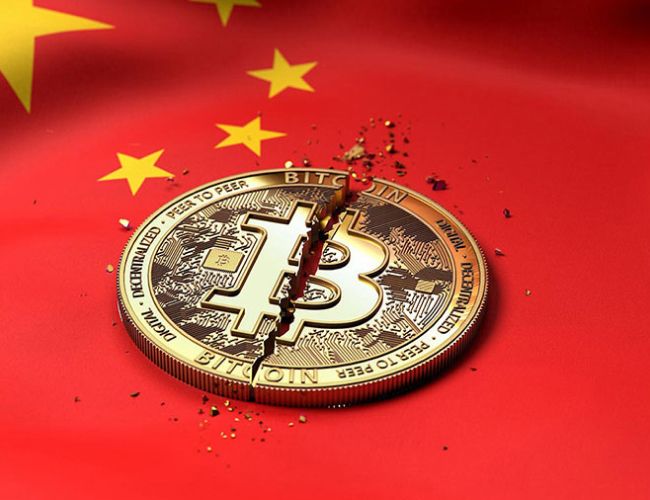China has made it clear that it is against the emergence of cryptocurrencies. It stated its intention to take a more robust stance on the issue and reiterated this position in a recent comprehensive economic statement.
Pan Gongsheng, the governor of the People’s Bank of China, made remarks regarding cryptocurrency activities on October 21, 2023. The nation does not support these activities, and this stance will not be altered anytime soon.
The People’s Bank of China Governor’s remarks come at a time when oppressive actions against cryptocurrency companies have become more intense and proceed to continue in 2024. The primary targets of these regulations are exchanges and miners, two essential components of the cryptocurrency ecosystem that Chinese regulators have declared unlawful. This stance has been in place since the nation outlawed domestic cryptocurrency exchanges in 2017.
Mainland Chinese Investors Barred from Hong Kong Bitcoin ETFs
That’s not all, Mainland Chinese investors set to be excluded from purchasing newly approved Bitcoin and Ether exchange-traded funds (ETFs) in Hong Kong, maintaining the stringent restrictions on cryptocurrency transactions imposed by mainland China.
Despite the recent launch of spot Bitcoin and Ether ETFs by three major Chinese asset managers, China Asset Management, Harvest Global Investments, and Bosera — mainland investors will not have access. These ETFs, introduced through their Hong Kong subsidiaries following Hong Kong’s approval of spot cryptocurrency ETFs, are inaccessible to Chinese nationals due to longstanding prohibitions.
Jack Wang, a Bloomberg data analyst, emphasized the exclusion during an April 24 webinar. He referenced a September 2021 decree from the Chinese State Council, which prohibits financial institutions from facilitating any cryptocurrency transactions. “Mainland Chinese citizens will not be able to participate in this,” Wang stated firmly. He added that even attempts to engage with futures-based crypto ETFs in Hong Kong were directly rejected by brokers.
Wang further noted that the introduction of these ETFs in Hong Kong is unlikely to alter the regulatory landscape in mainland China or attract mainland investors to the cryptocurrency market. “I would say it’s 100% not going to happen at least,” he said, reflecting a stark outlook for regulatory changes in the near future.
Thomas Zhu, head of digital assets at China Asset Management, indicated that any potential future participation by mainland investors would hinge on “enactment of forthcoming regulatory modifications.”
Highlighting the disparity in market sizes, James Seyffart, another Bloomberg analyst, pointed out that Bitcoin ETFs in the U.S. hold more assets than all ETFs in Hong Kong combined. With the U.S. ETF market valued at over $9 trillion and Hong Kong’s at approximately $50 billion, the scale and impact of these new spot crypto ETFs may be limited in the broader context. Seyffart’s comments underscore the significant differences in market dynamics and investor access between the regions.
Major Crackdown on Shadow Banking in China
The recent statements by the Central Bank governor and the ETFs saga are not the only acts of opposition by China towards, crypto. Recently, Chinese authorities dismantled an underground banking operation responsible for transacting at least 2.14 billion yuan ($295.8 million). This shadow bank engaged in illegal foreign currency exchanges between the South Korean won and the Chinese yuan, leveraging cryptocurrencies like Bitcoin.
The crackdown took place in Jilin province, located in Northeast China, where police detained six individuals linked to the illicit operation. The local police report, publicized through official media channels on May 12th, indicated that these suspects facilitated the cross-border currency transfers exploiting the decentralized and anonymous nature of Bitcoin transactions.
The criminal group executed over-the-counter cryptocurrency transactions and manipulated domestic accounts to receive and transfer funds. Their operations supported various businesses, including import-export trade companies, cross-border e-commerce platforms, and purchasing agents based in South Korea. This case highlights ongoing issues with shadow banking systems and underscores China’s continuing efforts to tighten money controls, which have inadvertently driven some individuals towards cryptocurrencies as a means to circumvent these regulations.
Persistent Crypto Activity Among Investors
Despite the recent moves against crypto, Chinese investors continue to use cryptocurrencies through peer-to-peer transactions or foreign platforms. China’s more stringent position on cryptocurrencies aims to reduce financial risks and stop illicit activity, yet it is clear that investor enthusiasm remains unaffected.
Anyway, the recognition of cryptocurrencies by a Chinese court raised hopes for a possible shift in the status quo. In September last year, the judiciary in China advanced the legal status of cryptocurrencies by acknowledging them as legitimate property. The shift, highlighted in an editorial from the reputable China Court Daily, introduced significant changes to the country’s digital currency landscape.
According to local Chinese reports, the editorial emphasized that cryptocurrencies have unique economic characteristics and that their market value is an undeniable fact. This acknowledgment originates from the widespread global use and acceptance of cryptocurrencies. Essentially, the editorial argued that since cryptocurrencies are legally recognized and actively exchanged worldwide, they deserve protection as legal property within China.
China’s approach to cryptocurrency has always been a focus of global attention due to its pivotal influence in the worldwide cryptocurrency market. However, substantial improvements in this area may take time to materialize.
 cryptonews.net
cryptonews.net
